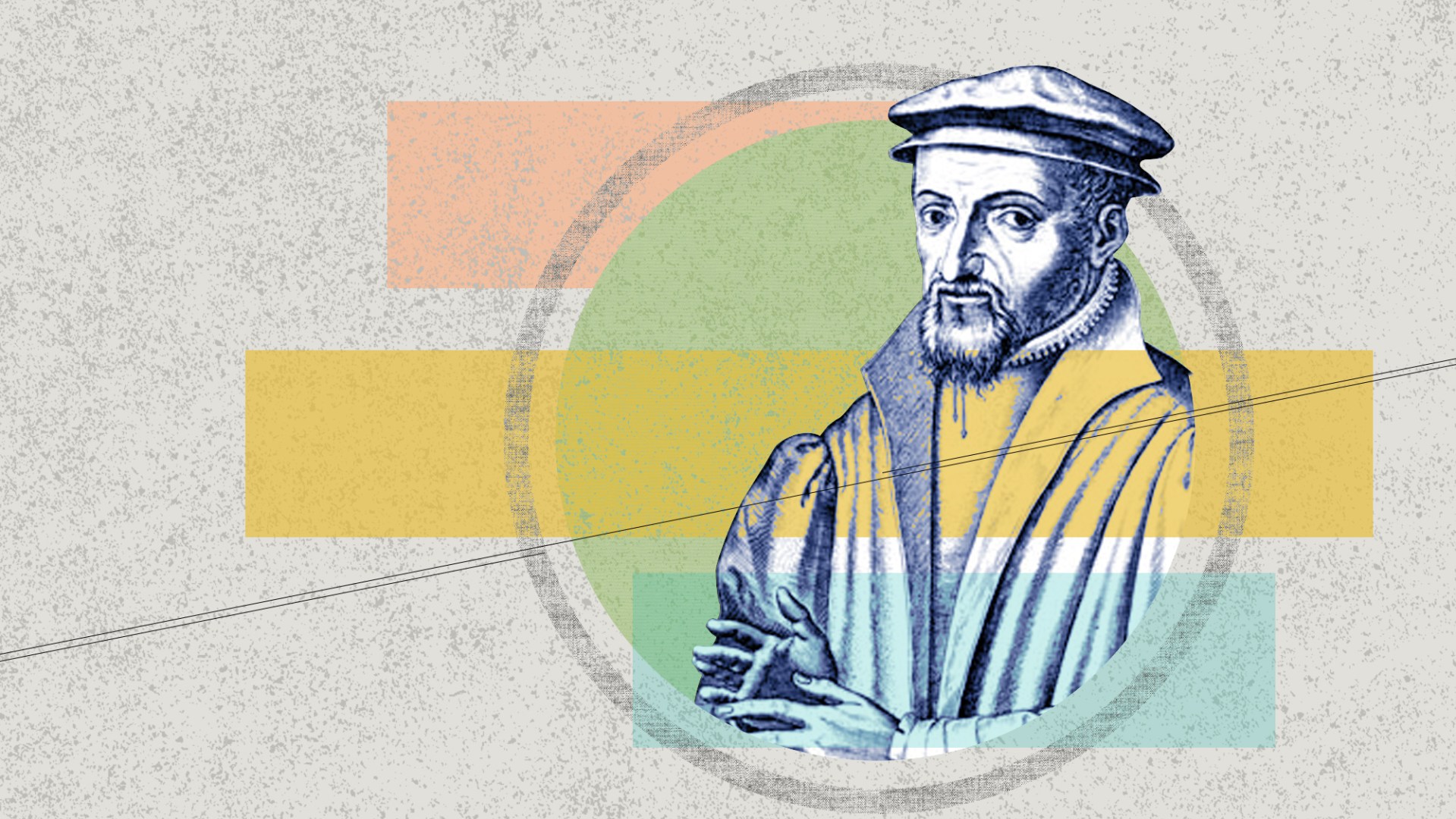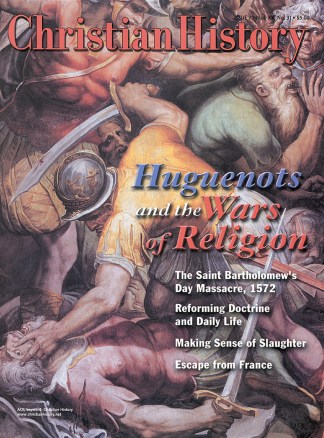No tourist in Geneva can miss the impressive Reformation Monument with its four towering figures: John Calvin, Guillaume Farel, Theodore Beza, and John Knox. Some visitors might even notice a series of reliefs on the statue's base, which depict various scenes from the Genevan Reformation. Yet only a sharp-eyed observer is likely to spot in one of the reliefs a spare man with a long beard preaching to a crowd of intent listeners: Pierre Viret, now virtually forgotten among the major reformers.
A changed man
Viret was born in the obscure village of Orbe, near Lausanne, in 1511. One of three sons of a poor tailor, Viret was a precocious child who benefited from a new village school where several of the teachers were trained humanists and suspected Lutherans. He developed an interest in the classics and theology which, in 1528, led him to study for the priesthood. He entered the Collège de Montaigu at the University of Paris at about the time Calvin was leaving and Ignatius Loyola was enrolling.
Viret left Paris two years later a changed man. The new Protestant ideas that were flourishing at the great university led to Viret's personal commitment to Christ.
Returning to Orbe, he found the village divided into Protestant and Catholic factions. Then Farel, the traveling evangelist largely responsible for this division, challenged young Viret to become a minister of the Gospel and to preach the Reformation in his native village. Viret resisted, then yielded to what the older man seemed to be certain was the will of God for Viret's life.
Viret possessed outstanding gifts as a Gospel orator. He won Orbe over to the Reformation. He was then asked to preach in Payerne, where he was badly wounded when a band of Catholics attempted to kill him, and at Neuchâtel before linking up again with Farel in Geneva in 1534.
Viret and Farel preached salvation and reform in Geneva for the next two years. The city was in an uproar: its citizens had decided to cast off the rule of the Catholic Duke of Savoy, but they had not yet embraced Protestantism. Viret celebrated the first Genevan baptism according to evangelical forms, took part with Farel in the debate that convinced the Council of Geneva to renounce Catholicism, and, in 1536, silently witnessed Farel accost Calvin and inform him of God's will for his life.
Catholic radicals tried again to silence Viret's voice, this time by poisoning his spinach soup. Viret suffered from digestive problems for the rest of his life, but he would not be intimidated.
Leading Lausanne
With the Protestant faith now firmly planted and Calvin ensconced alongside Farel, Viret left Geneva to help consolidate the Reformation in Lausanne, the chief city of his native Pays de Vaud. His ministry flourished in Lausanne as the city became overwhelmingly Reformed under his leadership. He also founded, supervised, and taught at an academy to train Protestant leaders and established social services to care for the city's unfortunate.
Viret lived in constant tension with the authorities in Berne, however, who wanted to keep a tight political rein on Lausanne. Following a confrontation at Easter 1559, the Bernese exiled Viret.
Soon thereafter, Viret joined his old friend Calvin in Geneva, bringing with him many of the Lausanne ministers, all but one of the faculty of the Academy of Lausanne, and nearly 1,000 of his parishioners. Calvin's city became the undisputed center of the Reformed world.
The Genevans loved Viret. They immediately elected him a minister of the Geneva Church and assigned him a salary of 800 florins plus 12 strikes of corn and two casks of wine a year. The Council also provided him a commodious house, which Calvin noted was bigger and better furnished than his own.
Despite his important assignment and generous treatment, Viret grew restless. Geneva was now almost completely Protestant and firmly under Calvin's theological control. News from France, where Protestants suffered harsh persecution and lacked pastoral guidance, turned his mind to a new challenge.
Harvest fields of France
In 1561 Viret requested leave from the Geneva Council and Company of Pastors to visit the land of the Huguenots. The official reason was that his ailing health demanded warmer climes. However, once in southern France, he quickly recovered sufficient strength to engage in continuous rounds of impassioned preaching.
He traveled first to Lyon, and then on to Nîmes, where he regularly preached to crowds numbering as many as 8,000—almost the entire population. Riots followed many of his sermons, despite Viret's pleas for peace. The disorders eventually subsided, and within a few months Nîmes was solidly Protestant.
In the meantime, invitations poured in from churches in Paris, Orléans, Avignon, Montauban, and Montpellier. The leaders of Nîmes begged him to remain with them. Finally, after much prayer, Viret moved to Montpellier, where he saw the conversion of nearly the entire faculty of the city's famous medical college. Only the outbreak of the first War of Religion interrupted his ministry. Though there was fighting in the Montpellier area, Viret's personal intercession apparently kept bloodshed to a minimum.
He then returned to Lyon, the major city of southeastern France, to begin a three-year ministry. Despite ill health, civil war, and a violent outbreak of the plague, Viret was able to establish his moral authority in the city. He preached daily to large crowds, counseled the soldiers of the Protestant army, and wrote at least 12 books while revising and reprinting several more, including his monumental Instruction chrestienne. He also ministered to victims of the plague and carried on a lively correspondence with other leaders of the Protestant Reformation.
Royal authority was re-established in Lyon in July, 1563, and with it Roman Catholic worship. In the months that followed, Viret participated in a pamphlet war with the returned Catholic leader and with various radicals and dissidents in the city. This multi-sided verbal warfare continued for nearly two years until local Catholic clergy obtained a royal order for Viret's expulsion from the kingdom of France. The notice giving him eight days to leave the country was delivered on August 27, 1565.
Viret fled to Béarn in Navarre, a semi-autonomous kingdom in what is now southwestern France. He was befriended there by Jeanne d'Albrêt, the staunchly Protestant Queen of Navarre and mother of the future Henry IV of France. She made Viret one of her chief advisers and superintendent of the academy she had established at Ortez.
Catholic forces captured Viret and 11 other Reformed ministers in a surprise attack during the third religious war (1568-1570). The Catholic commander ordered the execution of 7 of the 12 but spared Viret largely because of the positive reputation he enjoyed even among his ecclesiastical enemies. A few weeks later, he was rescued by counter-attacking Protestant forces and returned to his intense and successful ministry.
Secrets of Viret's success
How could Viret, a foreigner, become the most successful and sought-after Protestant preacher in sixteenth-century France?
First, his good reputation had preceded him. Many people had heard stories of the physical and verbal attacks he had suffered as an evangelist, but they sensed no malice about him. To the contrary, tales of his gentle spirit and kindly nature were common. He was also known as an eloquent preacher and as the author of more than 50 popular books.
Second, Viret's personality and pastoral heart endeared him to the Huguenots. Like his listeners, he knew sorrow: his first wife, two daughters, and a son died in the plagues that visited Lausanne, and he also lost two daughters and, eventually, his second wife to the plague during his years in France.
His letters to his friend Calvin reveal how these losses almost broke his spirit. Following the death of his first wife in 1546, he wrote: "The Lord has taken the half of myself from me. … I am so affected by this blow that I feel like a stranger in my own house."
Viret's well-attested sense of humor helped make him effective in both communication and conciliation. His books are laced with puns and satire, his two favorite brands of humor.
For example, one of his dialogues considered the best way to exorcise demons. One of his characters piously declares that this could only be done by fasting and prayer. Another character quips, "What a splendid way to get rid of monks and priests, who after all are real devils. Don't give them anything to eat and pray for them."
Viret's sensitivity is also illustrated by his ideas concerning education. Addressing both educators and parents, he wrote: "Some children you will have to keep bridled, some you will have to coax, some will need no discipline, some will be motivated by liberality, some by rewards and promises, and others by honor. Treat each child according to his temperament and needs. Some will have to be treated like spirited horses, some like gentle asses, and some like stubborn mules."
Third, Viret was effective and popular in France and elsewhere because of his personal piety and his biblically based ministry. Some would argue that Viret was the most biblical of all of the French Reformers. He was certainly less dogmatic than Calvin or Beza.
Though he participated in many public disputations, Viret did not seek controversy. He once wrote in a war-weary vein to his old friend Farel, "If I did not have the conviction that it was God who was pressing it on, I would never enter a controversy with a single person."
Viret believed that though Christians were sometimes persecuted, they should never be persecutors. He stressed the ancient Christian teaching that "human life is sacred" and opposed the execution of alleged heretics. Viret's spirit of conciliation seemed to lead Catholics and Protestants alike to regard him as one of the few to whom they could turn when they needed a fair-minded arbiter.
Viret died in 1571 as he was preparing for a trip to the National Synod of Reformed churches at La Rochelle. The Protestants in France greatly lamented his death. Jeanne d'Albrêt wrote to the Council of Geneva: "Among the great losses which I have sustained during and since the last war, I place in the fore-front the loss of Monsieur Viret."
Robert D. Linder is professor of history at Kansas State University in Manhattan and a widely published author whose books include the forthcoming Pierre Viret: Forgotten Reformer.
Copyright © 2001 by the author or Christianity Today/Christian History magazine. Click here for reprint information on Christian History.











